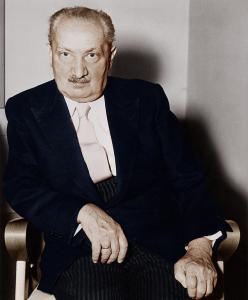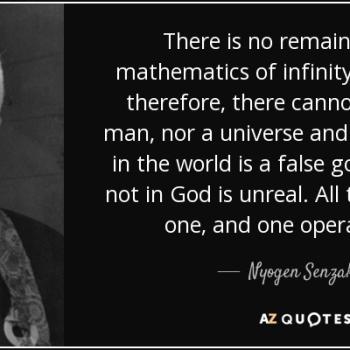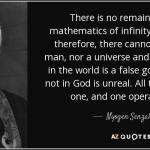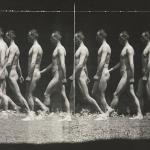Martin Heidegger was born in Messkirch, Germany, on this day, September 26th, 1889.
He started as a Catholic, briefly attending a Jesuit seminary before enrolling at the University of Freiburg. At first his principal interest was theology but he soon crossed over to philosophy.
He married Elfride Petri and they would have two sons. They remained married until his death, although I gather it is an established fact he had a long affair with Hannah Arendt. Given his moral lapses, a relationship I find particularly confusing if also illustrative about the complexities of the human heart. And once we touch that human heart, yes, always complex, always confusing.
His 1927 magnum opus Being and Time catapulted him to the forefront of continental philosophy. He would become one of the era’s leading Existentialists. And, he would be influential in an astonishing range of disciplines from phenomenology, to hermeneutics, to psychology, and on to theology. In fact he would go on to provide foundational work for many of the leading theorists of postmodernity. It is probably not possible to overstate his importance.
And Heidegger joined the Nazi party in 1933.
Joshua Rothman writing for the New Yorker, tell us:
“It’s often said that Heidegger wandered into Nazism because, with the daft egotism of a great philosopher, he thought that the Nazis agreed with him philosophically; when he realized that they weren’t intellectuals, he pulled away. He remained a member of the Party until 1945, but was on its margins. After the war, he said privately that his participation in the movement had been “the biggest stupidity of my life”; Hannah Arendt, who carried on a love affair with Heidegger for many years, said that she thought of his Nazism as an “escapade”—a poorly thought through attempt to “ ‘intervene’ in the world of human affairs.” And yet Heidegger never truly apologized for being a Nazi; even worse, he never directly and publically addressed the reality of the Holocaust before he died, in 1976.”
From recently published papers it’s also clear that Heidegger was a full on Anti-semite. (Again, I think of Arendt.) Given the circumstances of his life his unwillingness to ever publicly address the Holocaust creates a terrible silence. For me as a believer in the power and mystery of silence this particular silence reveals cascades of hurt. A crashing tide of ugliness follows that particular silence.
However, as Rothman tells us, at the very same time, “It’s impossible to disavow Heidegger’s thinking: it is too useful, and too influential, to be marginalized.” He was a great thinker. And particularly for those of us who live between East and West, he is a major contributor to creating the foundations for that bridge across the divide.
Now, in recent years it has been alleged that Heidegger in fact drew heavily and without crediting it on early German translations of Daoist and Buddhist texts. That is another problem. But, what is most important was his early synthesizing of these ideas, and articulating that synthesis in highly creative and inviting ways.
The Wikipedia article on Buddhism and Western Philosophy notes several parallels between Heidegger’s concepts of “Ab-grund (void), Das Nichts (the Nothing) and Dasein…” and their similarities to sunyata. And in his later years he rather famously said of the remarkable and far less but also controversial D. T. Suzuki, the first significant interpreter of Zen Buddhism to the West, “If I understand this man correctly, this is what I have been trying to say in all my writings.”
And so perhaps its not surprising how going the other way Heidegger has been a signal figure in the development of the Kyoto School, a Japanese meeting of Zen Buddhism and Western philsophy. The Kyoto School, also shadowed by the 2nd World War, is also nonetheless a terribly important movement to me. And, I know to many others living in this liminal space between East and West.
As Mr Rothman noted, Heidegger is just too important to dismiss or even marginalize. And, at the very same time, as the very same person, in such fundamental ways he was, well, a moral failure. For me he stands for many things, but near central among those many things, as a caution. He is someone I can learn from. And, I have. But, at some point I find I cannot just trust him and his reasoning. More is required.
Perhaps the most important gift is turning that harsh light on myself, and not trusting my own reasoning, or justifications. Not on the face of it. More is required.
What that more is, is of course, never completely obvious. Those of us who think we are free of our times are deluded. This has several consequences. One is that this stuff that we are, is at the same time the very stuff of our liberation. But that’s for unpacking elsewhere. Here, now, in this context, I find the way we take the principles found within our devotions and make them our guideposts on our path must always be put to some test or another.
For me this is a reminder to seek companions on the way. And, then, to not want all of them to think like me. The pillow as we Zen types sometimes call our discipline is critical to the matter. But, so are the various guidances of our ancestors. For me in particular the treasure troves of Zen teachings that begin to emerge in China and are expanded upon in Korea and for me most of all in Japan. They need to be consulted, engaged, fought with, and who knows what comes out of those wrestling matches? Although it will be something a bit different that my tastes or desires or prejudices would otherwise take me. And that’s just the beginning of that list of tests to which we need to put ourselves if we want to remain authentic on our path.
So, I guess this is just another small gift from that moral failure and great philosopher…
If you would like a sense of the man in a very interesting context, here Martin Heidegger is interviewed by a Thai monk, the bhikkhu Maha Mani in 1963. In German with English subtitles.














